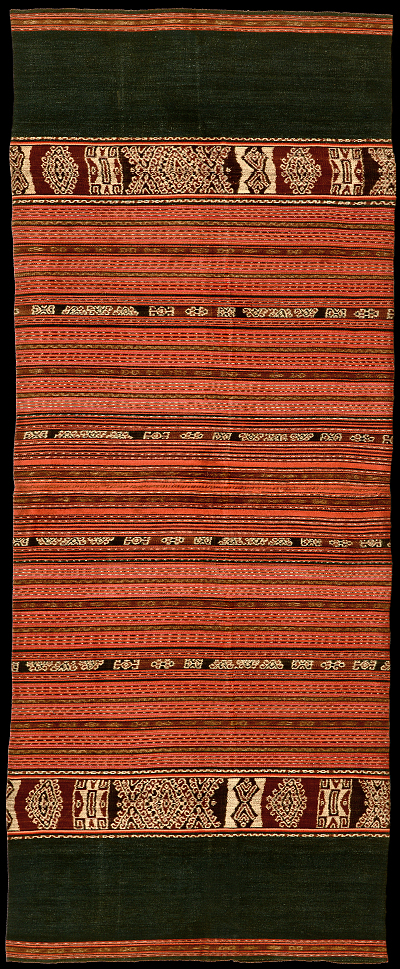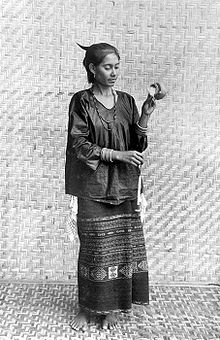| |
 
 | | | |
273 Moluccas, Kisar
Sarong  
| | Locale: | Probably Meher (Kisar speaking) people. | | Period: | 1900-1925 | | Yarn: | Cotton, hand-spun, medium - plus accent stripes in commercial cotton | | Technique: | Warp ikat | | Panels: | 2 | | Size: | 64 x 161 cm (2' 1" x 5' 3") LW: 2.52 | | Weight: | 870 g (30.7 oz), 422 g/m2 (1.38 oz/ft2) | | Design: | Classic Kisarese design for woman of the nobility, with two wide plain bands, four narrower bands in dark morinda and 'black' created by overdyeing morinda with indigo, and numerous narrow stripes ikated in white on red. Large tumpal motifs with Kisar's substantial 'feet' serve as finials. The square, boxy motif, kota lama, probably represents the place of settlement. The lozenge next to it is very similar to the Timorese kaif motifs (e.g. those on PC 285) which represent the connection with the ancestors. | | Comment: | Hand spun yarn and natural dyes in the main ikated bands, commercial yarn with synthetic dyes in the red pinstripes, as has been usual on Kisar from about the onset of the second quarter of the 20th c. Very well preserved. Ex collection J.B. Lüth. | | Background: | Chapters on Moluccas and Kisar. | | Published: | Ikat Textiles of the Indonesian Archipelago, 2018.
| | Compare: | 138 274 276 285 | | Sources: | Very similar to late 19th to early 20th C. homnon in Metropolitan Museum of Art, Nr. 1988.104.72, but longer. Similar to cloth for homnon in British Museum, Nr. As1949,10.2; to homnon in Tropenmuseum, Nr. 77-34, dated 1900-1925; and to one in Wereldmuseum, Nr. 24552, depicted in Magie van de Vrouw, but erroneously identified as 'Babar', and to one in Yoshimoto, Ikat, Fig. 199. Also similar to Khan Majlis, Indonesische Textilien, Wege zu Goettern und Ahnen, Fig. 500; De Jonge and Van Dijk, Vergeten Eilanden, Plate 8.3; and Voelger and Von Welck, Indonesian Textiles, the supplement by Khan Majlis, Fig. 195, 196. Similar sarong worn by Kisar woman spindle spinning on early 20th C. photo in collection Tropenmuseum, below.
 | | |

©Peter ten Hoopen, 2025
All rights reserved.
|
|


